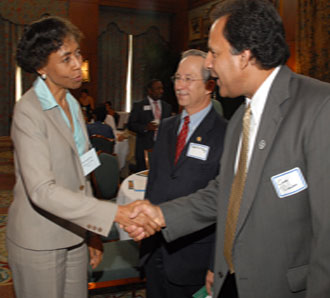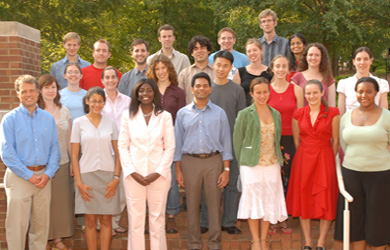

A publication of The Graduate School, University of North Carolina at Chapel Hill
On-Line Version Spring 2007
Home | Back issues | About us | The Graduate School | UNC-Chapel Hill | Make a gift

University Announces American Indian Center
 |
| AIC: Bernadette Gray-Little, left, David McCoy, center, and Greg Richardson connect the University with community interests. |
Continuing to build on its
commitment to American
Indians, UNC-Chapel Hill formally announced Sept. 7,
2006, that it will create one of the only centers on the East Coast and
the first center of its kind in the South to focus solely on American
Indian issues and research.
In June 2006, former Provost Robert Shelton approved a proposal for the center from the Provost’s Committee on Native American Issues.
“The creation of this Center will allow Carolina to develop the rich cultural and historical legacy of the state’s first people into an important area of scholarship and intellectual leadership,” said Dr. Bernadette Gray-Little, current executive vice chancellor and provost for the University.
Once the Center is operational it will provide an atmosphere to develop, support and advocate on behalf of existing American Indian initiatives on campus. The Center will also focus on nurturing and supporting quality research and scholarship on American Indian issues, disseminating this research to the public and native communities, and promoting the inclusion of American Indian cultures and traditions in Carolina’s learning environment.
“This certainly sets
the stage for a new and historic relationship between UNC-Chapel Hill
and American Indian communities of North Carolina,” said Greg Richardson,
executive director of the N.C. Commission of Indian Affairs. “The
Center will help create educational partnerships that benefit both Indian
communities and the university.”
University Fellows Welcome New Director
 |
| University Fellows: Director Thomas H. Kawula leads the University Fellows in finding interdisciplinary breadth and broader perspectives. |
The Graduate School’s interdisciplinary University Fellows program is under new leadership this year after Dr. Thomas H. Kawula became the program’s director in August, replacing outgoing director Jonathan Hess.
The University Fellows program offers students many opportunities to branch out and help their communities. Students are provided five years of funding, tuition, fees and health insurance from one of several privately endowed sources — the Kenan, Morehead, Pogue, Reynolds and Humphreys fellowships. The fellows interact and learn from one another and provide service to the University and the state.
Kawula, a faculty member in
microbiology and immunology, became interested in working with the intradepartmental
society after teaching a former
Royster Fellow. That association prompted him to join the Graduate School’s
Royster Society of Fellows Faculty Board
to help recruit and select fellows.
“If I had to point to
one thing that drew me to the University Fellows program, it
was my interactions with these recruits,” Kawula said. “Conversing
with these bright students drew me out of my own little research world
and gave me a broader perspective.”
As director, Kawula said he hopes to pass that perspective on.
“I have two main goals for this group of fellows. One is that they all gain not just an appreciation but an understanding of other disciplines and the value that each brings to the campus and to society,” he said. “The other is to step outside of the academic community to get both an appreciation and understanding of the people and culture of North Carolina. Carolina is a state school and I think it is important for both students and faculty to know the people that we serve.”
© 2007, The Graduate School, The University of
North Carolina at Chapel Hill
All text and images are property of The Graduate School
at the University of North Carolina-Chapel Hill. Contact Sandra Hoeflich
at shoeflic@email.unc.edu
to request permission for reproduction.